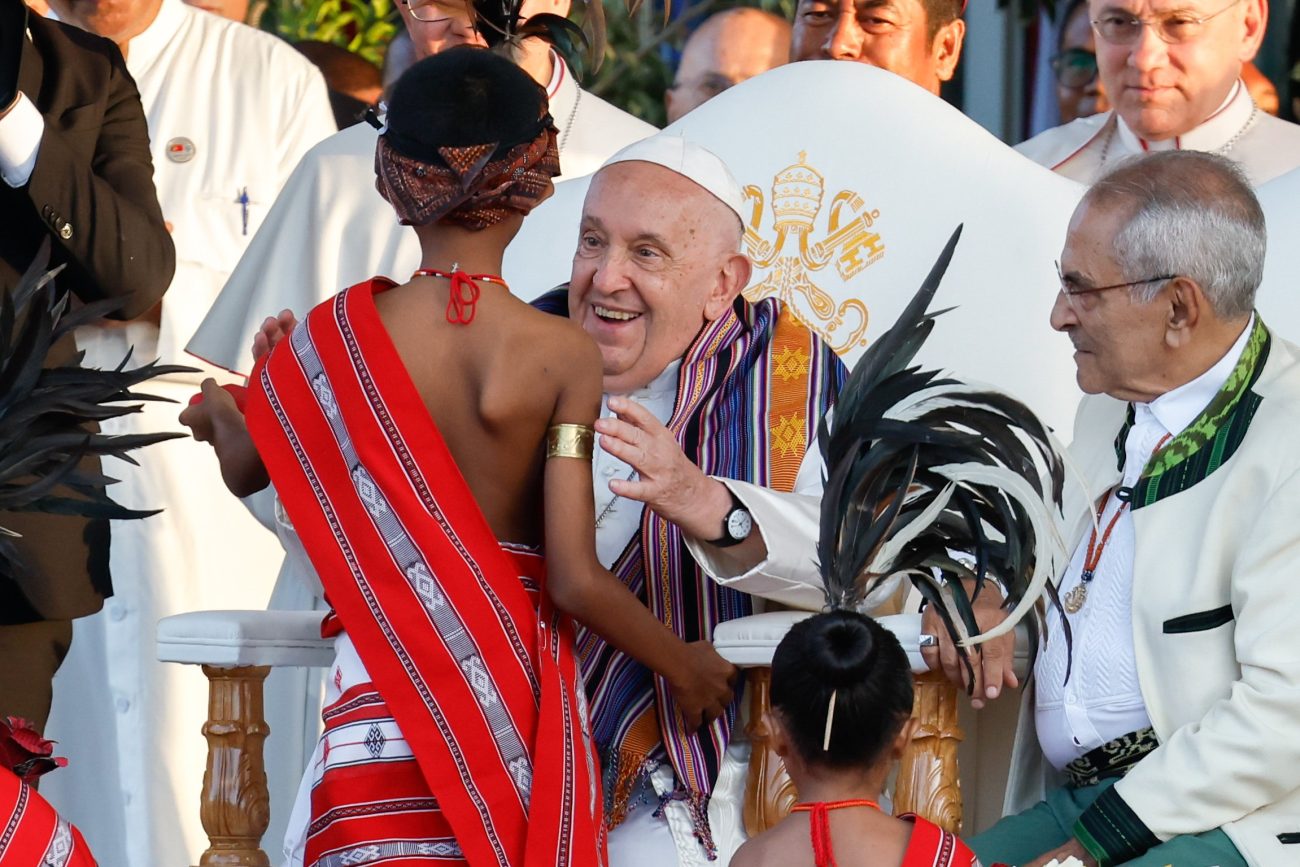DILI, Timor-Leste (CNS) — The faith that sustained the hope of the people of Timor-Leste in their struggle for independence should be a resource now as the country tries to cope with social, economic and environmental problems, Pope Francis said.
Landing in Dili Sept. 9, the pope was welcomed at the airport by both President José Ramos-Horta and Prime Minister Xanana Gusmão, as well as two children who offered him flowers, customary for when he arrives in a country, but also a “tais” — a traditional scarf.
Tens of thousands of people, young and old, lined the streets from the airport into the city to see Pope Francis as he rode by in an open popemobile. Many people took shelter from the sun under yellow and white umbrellas featuring the logo of the trip as well as the flags of Timor-Leste and the Vatican.
After an hour’s rest at the new, “green” Vatican nunciature, where he was staying, Pope Francis went to the presidential palace, where he received more flowers, another tais and hugs from the three girls chosen to give him the gifts.
Of the four nations the pope was visiting Sept. 2-13, Timor-Leste was the only one with a Catholic majority. According to Vatican statistics, close to 96% of the population is Catholic.
After Timor-Leste was granted independence from Portugal in 1975, Indonesian troops invaded; after more than 25 years of struggle and the deaths of as many as 100,000 people, Timor-Leste became an independent, democratic nation in 2002.
“You remained firm in hope even amid affliction and, thanks to the character of your people and your faith, you have turned sorrow into joy,” Pope Francis told government officials and leaders of civil society.
While the “dark clouds” of war have cleared, he said, the nation has “new challenges to face and new problems to solve. That is why I want to say: May the faith, which has enlightened and sustained you in the past, continue to inspire your present and future,” particularly with “principles, projects and choices in conformity with the Gospel.”
Poverty, underemployment, crime and emigration all are signs of the need for change and a commitment to working together for the common good, the pope said.
The president told Pope Francis that the government is working to fight “multi-dimensional poverty, hunger and food insecurity, maternal-childhood malnutrition, violence of any kind, different forms of exclusion and social marginalization.”
“Infants, children and youth have a right to a better world, where they can develop their potential in a peaceful, dignified and balanced family environment,” Ramos-Horta said.
Timor-Leste also is struggling with what the pope called “social scourges, such as the excessive use of alcohol and the formation of gangs by young people. These gang members are trained in martial arts, but instead of using this knowledge in the service of the defenseless, they use it as an opportunity to showcase the fleeting and harmful power of violence.”
The prime minister extended a ban on martial arts instruction in the country during the visit of Pope Francis as part of security measures for the pope; different martial arts groups have been known to engage in street fighting.
Pope Francis also spoke of children and adolescents whose dignity has been “violated,” and said, “We are all called to do everything possible to prevent every kind of abuse and guarantee a healthy and peaceful childhood for all young people.”
It was unclear whether Pope Francis’ general comment also was meant to refer to the case of former Bishop Carlos Filipe Ximenes Belo of Dili, who won the Nobel Peace Prize in 1996 with Ramos-Horta for nonviolent resistance to Indonesia’s occupation of his homeland, but who has been accused of sexually abusing boys.
Matteo Bruni, director of the Vatican press office, confirmed Aug. 30 that the restrictions imposed on Bishop Belo in 2020 after a Vatican investigation continue to be in force, including a prohibition from him returning to Timor-Leste. He is living in Portugal.
With some 65% of Timor-Leste’s population being under the age of 30, Pope Francis insisted it is essential for the nation to invest in education and supporting families.
The pope promised that, as it has done for centuries, the Catholic Church will contribute to that process through its schools and its efforts to educate Catholics in morality and in the social teaching of the church.
“Looking at your recent past and what has been accomplished so far, there is reason to be confident that your nation will likewise be able to face intelligently and creatively the difficulties and problems of today,” the pope said. “Trust the wisdom of the people.”
PREVIOUS: Pope in Remote Pacific Town: Match Creation’s Beauty with Beauty of Love
NEXT: Traditional Respect for Clergy Must Not be Exploited, Pope Says




Share this story